The quintessential Pretty Woman
It’s our distinct pleasure this week to shed a tear, grin a big ‘I told you so’ grin, shiver a shudder, and then tip our pompadour coiffure, for one of the acknowledged greats of the rock and roll idiom, the guru of the Gothic groove, Mr. Roy Orbison (1936-1988).
Roy grew up with the same rockabilly roots as his Sun Records stablemates Carl Perkins, Jerry Lee Lewis, Johnny Cash, and Elvis Presley; but he made his mark with a string of melodramatic, theatrical hits in the early 1960s, the only American to stave off the hegemony of the British Invasion.
Although he was a pleasant young man with a sense of humor, he suffered from acute stage fright, and developed a dark and brooding persona, clothed in black, hidden behind thick, dark glasses.
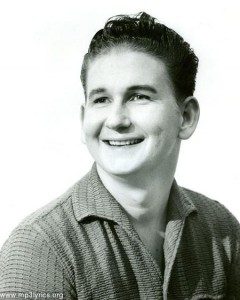 “I wasn’t trying to be weird, you know? I didn’t have a manager who told me how to dress or how to present myself or anything. But the image developed of a man of mystery and a quiet man in black somewhat of a recluse, although I never was, really.”
“I wasn’t trying to be weird, you know? I didn’t have a manager who told me how to dress or how to present myself or anything. But the image developed of a man of mystery and a quiet man in black somewhat of a recluse, although I never was, really.”
But the image was only the wrapping for Orbison’s real talent, his quavering quasi-operatic voice portraying narratives of unrequited love and yearning. In many of them, the protagonist is a loser, heartbroken, hopeless, often rescued by fortune from his fickle fate.
He had his first minor hit in 1956 with ‘Ooby Dooby’ for Sam Phillips’ Sun Records, but failed to capitalize on it. In 1958, his song ‘Claudette’ (written for his young wife, about whom we’ll hear a lot more later) was recorded by The Everly Brothers as the B-side of ‘All I Have to Do is Dream’.
![]() He struggled for several years in poverty, writing songs in the car because his wife and infant son filled their small apartment in Hendersonville, Tennessee. In 1960 he was finally signed by Monument Records and had the great fortune to be coupled with a visionary producer, Fred Foster. He offered his song ‘Only the Lonely’ to pals Elvis Presley and the Everlies, but they turned it down. Roy and Foster recorded it, and it hit #2 in the US. When Presley heard ‘Only the Lonely‘ for the first time, he bought a box of copies to hand out to his friends. He called Orbison “the greatest singer in the world”.
He struggled for several years in poverty, writing songs in the car because his wife and infant son filled their small apartment in Hendersonville, Tennessee. In 1960 he was finally signed by Monument Records and had the great fortune to be coupled with a visionary producer, Fred Foster. He offered his song ‘Only the Lonely’ to pals Elvis Presley and the Everlies, but they turned it down. Roy and Foster recorded it, and it hit #2 in the US. When Presley heard ‘Only the Lonely‘ for the first time, he bought a box of copies to hand out to his friends. He called Orbison “the greatest singer in the world”.
Orbison moved his family to Nashville, and there began the string of hits which would make his career and reputation. After a few minor successes, R0y and Foster went into the studio with ‘Running Scared,’ based loosely on the rhythm of Ravel’s ‘Boléro’. The session was full of problems. The orchestra was drowning out Roy’s soft voice, so Foster put him into the corner of the studio and surrounded him with coat racks, forming an improvised isolation booth. Then Orbison couldn’t hit the song’s highest note without his voice breaking. On the third take, he abandoned the idea of using falsetto and, to the astonishment of everyone present, sang the final high G# in a chest voice. Fred Foster later recalled, “Everybody looked around in amazement. Nobody had heard anything like it before.”
In the years 1960-65, Orbison and Foster had 15 Top 40 hits, including tough, swaggering cuts such as ‘Dream Baby’, my recent favorite ‘Candy Man‘ and the Ray Charles-inspired ‘Mean Woman Blues’. But most memorable were the wrenching operatic dramas of the perfect ‘Crying,’ ‘In Dreams‘ (here from David Lynch’s warped movie “Blue Velvet”), ‘The Crowd’, ‘Falling’, ‘It’s Over,’ ‘Love Hurts‘, ‘Blue Bayou‘, and culminating with our Song of The Week, ‘Pretty Woman‘.
In May 1963, Roy accepted an invitation to tour England on a bill with The Beatles, who were unknown in the United States at that time. The tour was sold-out in one afternoon. On the first night, Roy did fourteen encores before The Beatles could get on stage.
An eye witness: “I remember the cries for the Beatles as Orbison stepped out on stage. I wondered how he could cope with it, but he simply whispered, “A candy-coloured clown they call the Sandman” and he was away. The audience loved him and forgot the Beatles for thirty minutes.”
Roy Orbison: “I remember Paul and John grabbing me by my arms and not letting me go back to take my curtain call. The audience was yelling, ‘We want Roy, we want Roy,’ and there I was, being held captive by the Beatles who were saying, ‘Yankee, go home.’ We had a great time.”
Roy: “I messed up the first day I got there. I walked out in this little theatre and they had Beatle placards everywhere, life-size ones. And I said, ‘what’s all this? What is a Beatle anyway?’ John Lennon said, ‘I’m one’. He was standing right behind me.” Lennon and Orbison became quite friendly, but Roy’s relationship with George would prove more enduring.
Roy and Claudette were building a home back in Hendersonville, but while he was out on the road, she began an affair with their contractor. Their marriage was on the rocks. One morning in 1964, Roy Orbison was sitting in the kitchen working with his songwriting partner Bill Dees when Claudette came in and said she was going to go into town to buy something. Orbison asked if she needed any money, and Dees cracked, “Pretty woman never needs any money.” Orbison started singing, “Pretty woman walking down the street.” Dees: “He sang it while I was banging my hand down on the table. By the time she got back from shopping, we had the song.”
According to Orbison, it took them half an hour.
Orbison: “I never analyzed the song; it was really just another form of girl-watching – the guy is coming on real macho, trying to pick her up, then he tries toning it down, and then he gets more sensitive, but nothing works, so he gives up. Then she decides to get caught. It’s a sort of mini-epic.”
Dees describes the song thus: “From the moment that the rhythm started, I could hear the heels clicking on the pavement, click, click, the pretty woman walking down the street, in a yellow skirt and red shoes. We wrote ‘Oh, Pretty Woman’ on a Friday, the next Friday we recorded it, and the next Friday it was out. It was the fastest thing I ever saw. Actually, the “yeah, yeah, yeah” in ‘Oh, Pretty Woman’ probably came from The Beatles.” It was recorded on August 1st, 1964. It was on the charts for 14 weeks, at #1 for three, and sold seven million copies in 1964 alone! Chet Atkins called it “best rock & roll record ever made”.
Fred Foster mentions that a tenor sax and a baritone sax are both ‘buried in the guitar mix’ in an effort to fill out the sound. One critic wrote: “This is one of the very few songs to have all six recognized hooks: great intro, catchy tune, a repeated phrase, interesting story, good rhythm, sound effects. The simple heavy beat here simulates the beat of his and her walk (2 to a bar), because when he stops and she stops, the beat dies away.” Hmm.
‘Oh, Pretty Woman’ was almost Orbison’s last hit before his personal life unraveled. In 1965, Claudette discovered Roy was cheating on her, and they were divorced. In 1966, they remarried. On June 6, Roy and Claudette were riding their motorcyles when a truck pulled out in front of her. She died in his arms an hour later, aged 25.
On September 14, 1968, while Orbison was on tour in England, he received a call that the Orbison family home at Old Hickory Lake in Hendersonville, Tennessee had burned to the ground. His two older sons, Roy Jr. (b. 1958) and Anthony (b. 1962) died in the fire. His youngest son, Wesley, aged three, was saved by Orbison’s parents.
Roy’s close friend and neighbor Johnny Cash bought the lot from him. Ten years later, the house that Cash built there burned down as well. Here they are singing ‘Pretty Woman’ together. It’s a shame they didn’t rehearse it in order to be able to do it in harmony; it could have been stunning.
Over the next 20 years, Roy had his ups and downs. He married a German teenager he met a couple of days before the fire, and they had two sons together.
Musically, Roy languished in a few mediocre attempts to record. Here’s a clip from those doldrum years of Roy performing on Japanese TV. The scene pales “Lost In Translation” in its bizarre accidental Occidental hero-cultiness: “Radies and gentremen, Loy Olbison!” Truly, a clip that must be seen to be believed. And even then, you may think you’re nightmaring.
Then in 1987, Loy Olbison was inducted into the Rock and Roll Hall of Fame. In the induction speech, Bruce Springsteen said, “I wanted a record with words like Bob Dylan that sounded like Phil Spector – but, most of all, I wanted to sing like Roy Orbison. Now everyone knows that no one sings like Roy Orbison.” Orbison said that he felt “validated” by the honor.
A few months later, a tribute was organized for him in the form of a filmed concert at the Coconut Grove Ballroom in Los Angeles. The DVD, “Roy Orbison and Friends, A Black and White Night”, sold 50,000 copies. Orbison is backed by Elvis (Presley’s) band – Glen Hardin on piano, Ron Tuttle on Drums, Jerry Scheff on bass, and James Burton on lead guitar. Also pitching in were Springsteen, Jackson Browne, Elvis Costello, Tom Waits, J.D. Souther, T-Bone Burnett, Bonnie Raitt, k.d. lang, and Jennifer Warnes. The performance there of ‘Oh, Pretty Woman’ won the Grammy Award for Best Male Pop Vocal Performance.
Orbison had been collaborating on a new album with Electric Light Orchestra frontman Jeff Lynne, who was producing George Harrison’s Cloud Nine. The three had lunch one day, and Harrison invited Orbison to sing on the album. They contacted Bob Dylan, who said they could use the recording studio in his home. Along the way, Harrison had to stop by Tom Petty’s house to pick up his guitar. By that evening, the group had written ‘Handle with Care’, which led to the idea of recording an entire album. They called themselves the Traveling Wilburys, and the resulting album stayed on the US charts for a full year.
Lynne: “Everybody just sat there going, ‘Wow, it’s Roy Orbison!’ Even though he’s become your pal and you’re hanging out and having a laugh and going to dinner, as soon as he gets behind that mike and he’s doing his business, suddenly it’s shudder time.”
In 1988, he recorded the album “Mystery Girl” with Lynne as producer and contributions from Bono, Elvis Costello, Orbison’s son Wesley, Lynne and Petty, and began touring again. During a break between tours, after spending the day flying model airplanes with his sons and having dinner at his mother’s home in Tennessee, he keeled over and died of massive heart failure. He was 52.
In 1990, Julia Roberts and Richard Gere starred in the mega-hit romanitic comedy “Pretty Woman”, which took its title and much of its spirit from the theme song. Here’s a clip demonstrating how Julia Roberts became the quintessential Pretty Woman, fulfilling exactly the image Orbison and Dees had when they wrote it 25 years earlier.
Here’s a nice live version from 1964.
Here’s a live version from 1982. He hasn’t aged much over the 20 years, only the growl has gotten longer. Can you imagine being able to walk down any street in the world, from Nashville to New York, from Tokyo to Rome, and you just growl that growl and the most beautiful women in the world will drop at your feet? Move over, Richard Gere.
To say that there were parallels between his musical dramas and his life would be too obvious. Let’s just say that Roy Orbison made some Monumental records, and we’re glad to have the opportunity to give him a bit of the credit due to him.
 Pretty woman, walking down the street,
Pretty woman, walking down the street,
Pretty woman, the kind I like to meet,
Pretty woman
I don’t believe you, you’re not the truth,
No one could look as good as you,
Mercy.
Pretty woman, won’t you pardon me?
Pretty woman, I couldn’t help see,
Pretty woman,
That you look lovely as can be.
Are you lonely just like me?
Wow.
Pretty woman, stop a while.
Pretty woman, talk a while.
Pretty woman, give your smile to me.
Pretty woman, yeah yeah yeah.
Pretty woman, look my way.
Pretty woman, say you’ll stay with me.
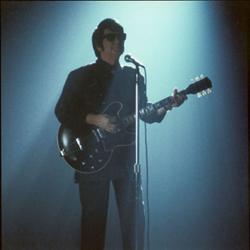 ‘Cause I need you, I’ll treat you right.
‘Cause I need you, I’ll treat you right.
Come with me baby, be mine tonight.
Pretty woman, don’t walk on by,
Pretty woman, don’t make me cry,
Pretty woman, don’t walk away, hey…okay–
If that’s the way it must be, okay.
I guess I’ll go on home, it’s late.
There’ll be tomorrow night, but wait –
What do I see?
Is she walking back to me?
Yeah, she’s walking back to me!
Oh, oh, Pretty woman!
If you enjoyed this post, you may also enjoy:
002: Buddy Holly, ‘Learning the Game’

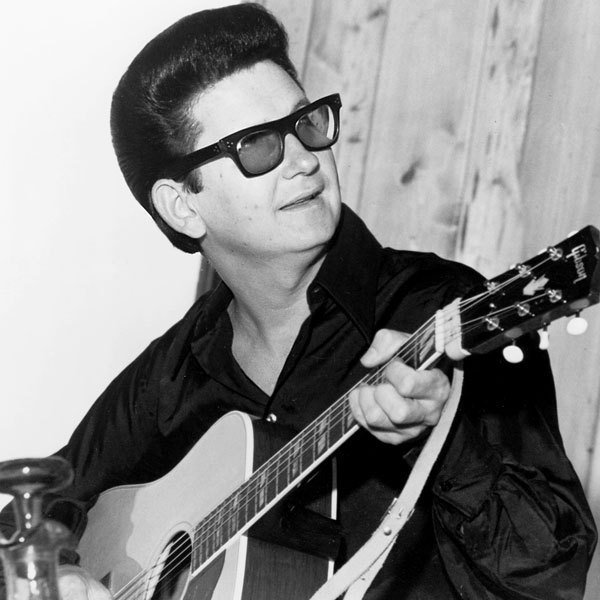
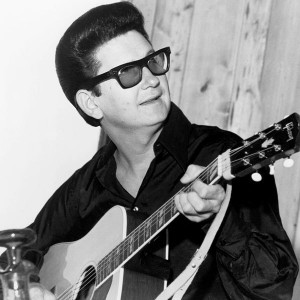
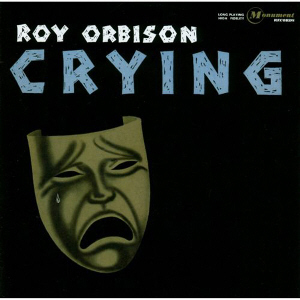
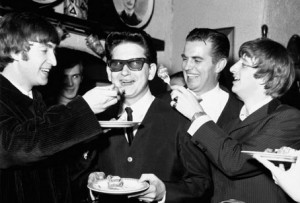
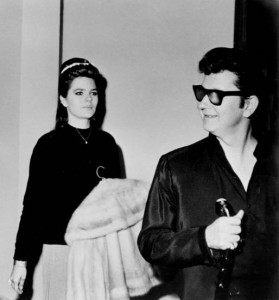
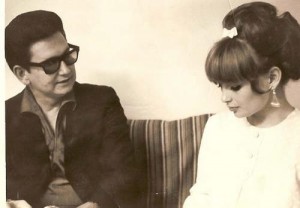

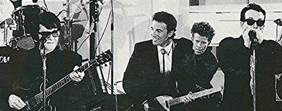
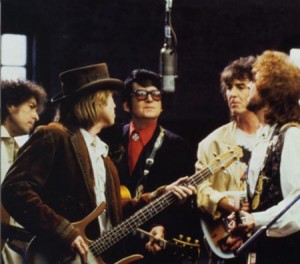
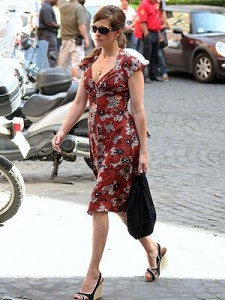
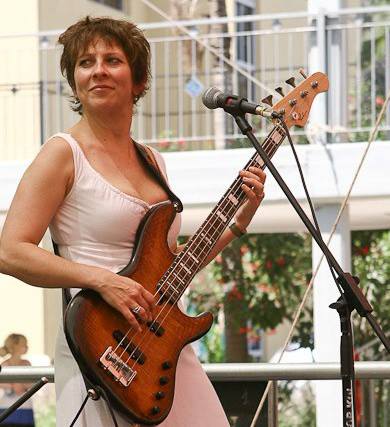


I tried, I really did. I admit it, I’m a philistine – I don’t care. Bring back Hermeto. Or Gilberto. Or even Stephan Stills.
driving home from ashkelon after a coastal shabbat with the frams and bruce springsteen’s thunderoad comes on–“roy orbison singing for the lonely, hey it’s me and i want you only.” always loved that line. unpack the bags, turn on the computer and roy orbison is actually singing for the lonely. didn’t know about his sad biography but great songs and a great voice.
Good article. I remember when I saw that Black and White Night how surprised I was that it was so lifeless considering all of the all-star talent on stage. Obviously not everyone agreed.
What is your source for the following Orbison comment: “I never analyzed the song; it was really just another form of girl-watching – the guy is coming on real macho, trying to pick her up, then he tries toning it down, and then he gets more sensitive, but nothing works, so he gives up. Then she decides to get caught. It’s a sort of mini-epic.”
I am writing a paper on “Oh, Pretty Woman” and would like to cite it.
Thank you!
Best,
Taylor
Sorry, Taylor, I have no idea. I wouldn’t have made it up, but I don’t see it in any of my usual sources.
Out of my own little Pooh-brain.
this is so interesting. I knew he lived here but really knew nothing about him. I honestly think his life story would make an amazing movie. Such a sad life in so many ways. Now I’m going back and listening to his songs again. Thanks for this amazing post!
I remember the “chill down my spine” sensation every time those first notes came across the airwaves. Even as a young teenager with no real world experience, I recognized the sound of seduction, the often unspoken conversations that take place between people.
Orbison and baseball were the two obsessions I shared with my troubled father.
Thank you for sharing.